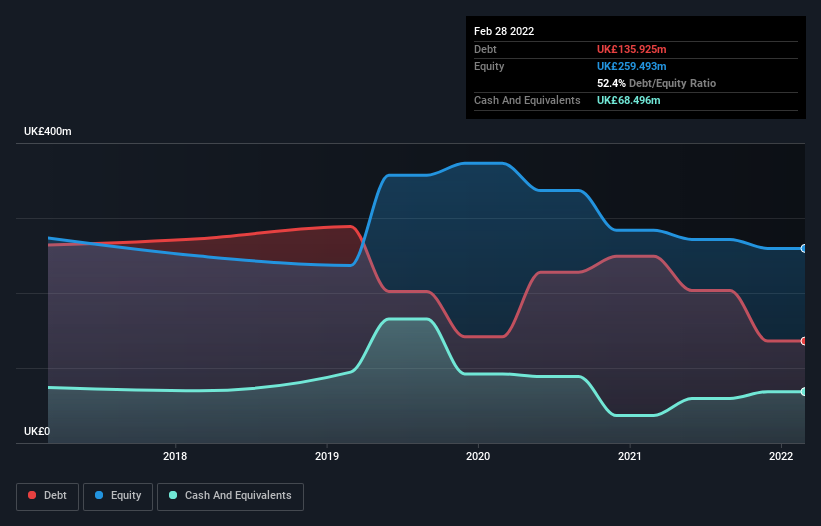The external fund manager backed by Berkshire Hathaway's Charlie Munger, Li Lu, makes no bones about it when he says 'The biggest investment risk is not the volatility of prices, but whether you will suffer a permanent loss of capital.' It's only natural to consider a company's balance sheet when you examine how risky it is, since debt is often involved when a business collapses. As with many other companies Trainline Plc (LON:TRN) makes use of debt. But should shareholders be worried about its use of debt?
Why Does Debt Bring Risk?
Debt assists a business until the business has trouble paying it off, either with new capital or with free cash flow. Ultimately, if the company can't fulfill its legal obligations to repay debt, shareholders could walk away with nothing. However, a more common (but still painful) scenario is that it has to raise new equity capital at a low price, thus permanently diluting shareholders. By replacing dilution, though, debt can be an extremely good tool for businesses that need capital to invest in growth at high rates of return. The first thing to do when considering how much debt a business uses is to look at its cash and debt together.
View our latest analysis for Trainline
What Is Trainline's Debt?
You can click the graphic below for the historical numbers, but it shows that Trainline had UK£135.9m of debt in February 2022, down from UK£248.8m, one year before. However, it does have UK£68.5m in cash offsetting this, leading to net debt of about UK£67.4m.

How Strong Is Trainline's Balance Sheet?
According to the last reported balance sheet, Trainline had liabilities of UK£232.6m due within 12 months, and liabilities of UK£150.9m due beyond 12 months. On the other hand, it had cash of UK£68.5m and UK£44.9m worth of receivables due within a year. So its liabilities outweigh the sum of its cash and (near-term) receivables by UK£270.1m.
Given Trainline has a market capitalization of UK£1.76b, it's hard to believe these liabilities pose much threat. Having said that, it's clear that we should continue to monitor its balance sheet, lest it change for the worse. There's no doubt that we learn most about debt from the balance sheet. But ultimately the future profitability of the business will decide if Trainline can strengthen its balance sheet over time. So if you're focused on the future you can check out this free report showing analyst profit forecasts.
In the last year Trainline wasn't profitable at an EBIT level, but managed to grow its revenue by 181%, to UK£189m. So there's no doubt that shareholders are cheering for growth
Caveat Emptor
Despite the top line growth, Trainline still had an earnings before interest and tax (EBIT) loss over the last year. To be specific the EBIT loss came in at UK£10m. Considering that alongside the liabilities mentioned above does not give us much confidence that company should be using so much debt. Quite frankly we think the balance sheet is far from match-fit, although it could be improved with time. We would feel better if it turned its trailing twelve month loss of UK£12m into a profit. So in short it's a really risky stock. There's no doubt that we learn most about debt from the balance sheet. But ultimately, every company can contain risks that exist outside of the balance sheet. For example - Trainline has 1 warning sign we think you should be aware of.
If you're interested in investing in businesses that can grow profits without the burden of debt, then check out this free list of growing businesses that have net cash on the balance sheet.
Valuation is complex, but we're here to simplify it.
Discover if Trainline might be undervalued or overvalued with our detailed analysis, featuring fair value estimates, potential risks, dividends, insider trades, and its financial condition.
Access Free AnalysisHave feedback on this article? Concerned about the content? Get in touch with us directly. Alternatively, email editorial-team (at) simplywallst.com.
This article by Simply Wall St is general in nature. We provide commentary based on historical data and analyst forecasts only using an unbiased methodology and our articles are not intended to be financial advice. It does not constitute a recommendation to buy or sell any stock, and does not take account of your objectives, or your financial situation. We aim to bring you long-term focused analysis driven by fundamental data. Note that our analysis may not factor in the latest price-sensitive company announcements or qualitative material. Simply Wall St has no position in any stocks mentioned.
About LSE:TRN
Trainline
Engages in the operation of an independent rail and coach travel platform that sells rail and coach tickets worldwide.
Undervalued with solid track record.
Market Insights
Community Narratives



